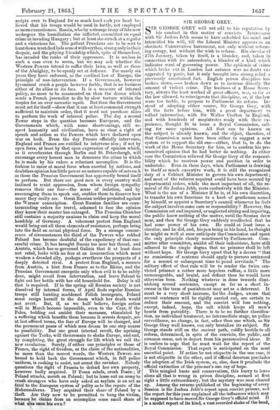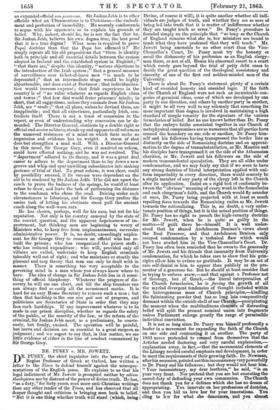SIR GEORGE GREY.
SIR GEORGE GREY will not add to his reputation by his conduct in this matter of convicts. Intercourse with Sir Joshua Jebb seems to have enfeebled his mind and intensified his will, till the Liberal Minister appears as an obstinate Conservative bureaucrat, not only without reform- ing energy, but without the wish to reform. His circular of 27th January, taken by itself, is a blunder, and, taken in connection with its antecedents, a blunder of a kind which indicates want of governing power. The epidemic of crime which broke out in London last autumn was no doubt ex- aggerated by panic, but it only brought into strong relief a previously ascertained fact. English prison discipline has broken down,—so broken down as to increase directly the amount of violent crime. The business of a Rome Secre- tary, always the least worked of great officers, was, so far as the law allowed, to reinvigorate that discipline, or, if the law were too feeble, to propose to Parliament its reform. In- stead of adopting either course, Sir George Grey, with all the facts before him, with a great department to collect information, with Sir Walter Crofton in England, and with hundreds of magistrates ready with their ex- perience, thought fit to issue a Royal Commission, call- ing for more opinions. All that can be known on the subject is already known, and the object, therefore, of that Commission must have been either to suggest a new system or to support the old one—either, that is, to do the work of the Home Secretary for him, or to confirm his pre- conceived opinion that he had better do nothing. In either case the Commission relieved Sir George Grey of the responsi- bility which he receives power and position in order to undertake. Even in these days, when Parliament is drawing to itself so much executive work, it is still the recognized duty of a Cabinet Minister to govern his own department ; and most of the reforms required could have been secured by departmental orders, while the most important of all, the re- moval of Sir Joshua Jebb, rests exclusively with the Minister. What is the use of a Minister if he is, at his own discretion, to transfer his own functions to a knot of gentlemen named by himself, or appoint a Secretary's council whenever he feels the subject involves some care or responsibility ? However, the Commission sat and inquired, or neglected sitting and inquiring, the public knew nothing of the matter, until the Session drew near, and then Sir George Grey suddenly recollected that he had some power of his own. He could at least issue a circular, and he did, and, his pen being in his hand, he thought he might as well at once anticipate the Commission and upset the only principle clearly sanctioned by Parliament. Com- mittee after committee, amidst all their indecisions, have still adhered to the single dogma that no prisoner shall be left without hope. Sir George Grey upset that by a decree " that no remissions of sentence should apply to persons sentenced for a second or subsequent time to penal servitude." The solitary effect of that rule will be to render the twice con- victed prisoner a rather more hopeless ruffian, a little more unmanageable, and brutal, and defiant than ho would have otherwise been. Nothing whatever is done towards -dimi- nishing second sentences, except so far as a short in- crease in the term of punishment may act as a deterrent. It must be a very short increase, for the Judges, aware that second sentences will be rigidly carried out, are certain to reduce their amount, and the convict will lose nothing, except, indeed, hope, the salt which keeps all men's hearts from putridity. There is to be no further classifica- tion, no individual treatment, no intermediate stage, no police surveillance, no change, in fact, other than one which, as Sir George Grey well knows, can only brutalize its subject. Sir George stands still on the ancient path, coldly hostile to all reform, determined, in spite of the convicts, the public, and common sense, not to depart from his preconceived ideas. It is useless to urge that he must wait for the report of the Royal Commission. That report is anticipated on the most essential point. If action be not etiquette in the one case, it is not etiquette in the other, and if official decorum precludes the adoption of the Irish system, so, also, does it preclude the official extinction of the prisoner's one ray of hope.
This mingled haste and conservatism, this hurry to leave alone all that is wrong in prison discipline, seemed at first sight a little extraordinary, but the mystery was soon cleared up. Among the returns published at the beginning of every Session is Sir Joshua Jebb's report upon convict prisons, and
the report for this year explained all the influences which may be supposed to have moved Sir George Grey's official mind. It is a model report of its kind, a vast recorded shake of the head, an expanded official non possumus. Sir Joshua Jebb is to other officials what an Ultramontane is to Christians—the embodi- ment and perfection of immobility. He scarcely condescends to argue with his opponents, or to explain his grounds of belief. Why, indeed, should he, for is not the fact that he, Sir Joshua Jebb, believes his own dogma true, the best proof that it is a true dogma ? What more is required to prove Pupal doctrine than that the Pope has affirmed it? He simply repeats all his old propositions that "there is identity both in principle and all essential details between the system adopted in Ireland and the established system in. England ; " "that there are," despite this identity, "serious objections to the introduction of the Irish system ;" that a general measure of surveillance over ticket-of-leave men " is much to be deprecated ;" that an intermediate stage would be highly objectionable, and does exist at Dartmoor ; that individualiza- tion would increase expense-; that Irish experience in the country is of " no value whatever as regards English cities and towns ;" that low diet would fester prisoners' minds ; in short, that all suggestions, unless they emanate from Sir Joshua Jebb, are " crude ;" that all plans, unless he devised them, are inapplicable ; and that all experience, particularly Irish, con- tradicts itself. There is not a trace of concession in the report, or even of understanding why concession can be de- manded. The Director-General, obstinate by a double right as official and ancien militaire, stands up and opposesto all reformers the unmoved resistance of a mind on which facts make no impression and evidence has no weight. A storm of shot does but strengthen a mud wall. With a Director-General in this mood, Sir George Grey, even if resolved on reform, could have effected nothing, and he was not resolved. The " department" adhered to its theory, and it was a great deal easier to adhere to the department than to lay down a new groove and whip and spur unwilling subordinates into making pretence of trial of that. No great reform, it was clear, could by possibility succeed, if its success were dependent on the aid to be rendered by Sir Joshua Jebb. If he did not upset the coach to prove the badness of the springs, he would at least refuse to draw, and leave the task of performing the distance to the coachman who chose the road. Driving under such circumstances is laborious, and Sir George Grey prefers the easier task of letting his obstinate steed pull the ancient coach along the well-worn ruts.
He has chosen, perhaps, well for his ease, but not for his reputation. Not only is the country annoyed by the state of the convict question, and the apparent hopelessness of im- protement, but thinking men are beginning to weary of Ministers who, to keep free from unpleasantnesses, surrender administrative power. It is, no doubt, exceedingly unplea- sant for Sir George Grey to remove an official who has re- built the prisons ; who has reorganized the prison staffs ; who has reduced expenditure ; who will, provided only all villains are exiled, undertake to keep English criminals tolerably well out of sight; and who maintains so stoutly the pleasant and easy theory that men can only be dealt with in masses. There is something too very acceptable to the governing mind in a man whom you always know where to have. The idea of change in Sir Joshua Jebb has in it some- thing of official blasphemy. Whatever the progress of dis- covery he will use one chart, and till the ship founders one can always find so easily all the accustomed marks. It is hard for an easy Home Secretary to remove such a man ; but then that hardship is the one sine qud nog of progress, and politicians are Secretaries of State in order that they may face such hardships. If any improvement whatever is to be made in our prison discipline, whether as regards the safety of the public, or the sanctity of the law, or the reform of the criminal, Sir Joshua Jebb must, as a preliminary, be courte- ously, but firmly, excised. The operation will be painful, but nerve and decision are as essential to a great surgeon as Judgment; and we regret to say that, in this matter, we see little evidence of either in the line of conduct commenced by Sir George Grey.































 Previous page
Previous page